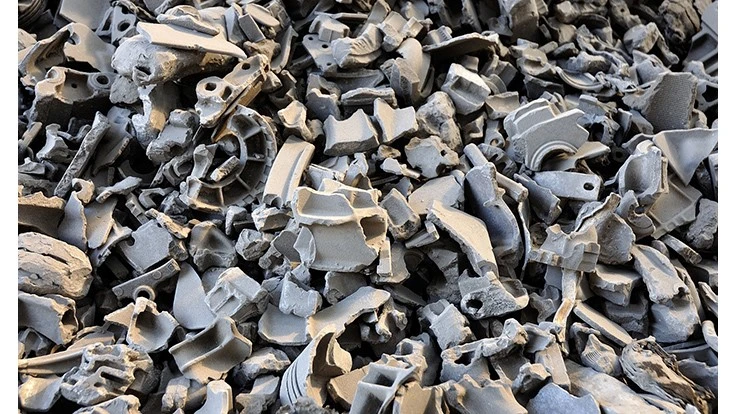
The Ministry of Commerce of the People’s Republic of China issued a notice Monday, April 2, 2018, stating a previously announced 25 percent tariff on aluminum scrap imported from the United States would take effect immediately.
The ministry’s announcement claims the suggested tariffs on metal received widespread support within China during a brief comment period.
A scrap trader contacted by Recycling Today said aluminum scrap buyers in China had been scrambling to clear shipments of zorba, twitch and other types of aluminum scrap during the brief comment period. The trader indicated some buyers are already signaling intentions to favor purchases of scrap from Europe and other parts of the world.
The April 2 Chinese Ministry of Commerce notice reads in part, “On March 23, the Ministry of Commerce issued a list of suspension and concession products for steel and aluminum imports from the United States and solicited public opinions. On March 31, the comment period ended. During the comment period, a large number of people expressed their support for measures and product lists by telephone, email, etc., and agreed that the government should take measures to safeguard the interests of the state and the industry. Some people also suggested increasing [the] measures. After evaluation, it was decided to implement the [existing] measures on 128 products imported from the United States.”
China’s government also defends the tariffs as a necessary countermeasure to the Section 232 tariffs previously announced by the Trump administration. “The Chinese side believes that the U.S. side adopts 232 measures on imported steel and aluminum products and abuses the ‘security exceptions’ clause of the World Trade Organization [and] that its measures [are] seriously violating the principle of nondiscrimination as a cornerstone of the multilateral trading system.”
Although trade-related negotiations are underway between U.S. and Chinese officials, the Chinese Ministry of Commerce states, “In view of the lack of agreement between the parties, on March 29, China notified the WTO of the suspension of the concession list and decided to impose tariffs on certain products imported from the United States in order to balance the loss of profits caused by the U.S. 232 measures against the Chinese side.”
The announcement concludes with a verbal olive branch, with the ministry commenting, “As the two largest economies in the world, cooperation between China and the United States is the only correct choice. The two sides should resolve their concerns through dialogue and negotiation, achieve common development and avoid subsequent actions that will cause greater damage to the overall Sino-U.S. cooperation.”
In a Wednesday, April 4, interview with National Public Radio, Director of the White House National Trade Council Peter Navarro said the Section 232 tariffs are necessary for national security reasons to protect America’s steel and aluminum industries. Regarding a broader “trade war,” Navarro indicated the Trump administration will continue to tie the future of U.S.-China trade to the status of intellectual property rights and technology transfer issues in China.
According to statistics gathered by the Washington-based Institute of Scrap Recycling Industries (ISRI), China imported more than 2 million metric tons of aluminum scrap each year between 2007 and 2015.
That scrap came from several nations, but considering the U.S. has been the world’s leading aluminum scrap exporter each year since at least 2005 (per the same set of statistics), a healthy percentage of China’s imports each year comes from the U.S.
ISRI in late March issued a brief statement regarding the 25 percent import tariff that read in part, “In 2017, the United States exported more than $1.1 billion worth of aluminum scrap to China, [with aluminum scrap having] been in a positive trade balance for more than a decade. The Chinese government’s announcement will impact this significant U.S. scrap export, spurring concern that exports of additional scrap commodities could be impacted in future announcements.”
The association continues, “A 25 percent tariff [will] mean a nearly $300 million price burden on a trade relationship that represents nearly 25 percent of the entire world’s trade in aluminum scrap.”
Get curated news on YOUR industry.
Enter your email to receive our newsletters.
Latest from Recycling Today
- Foreign Pollution Fee Act addresses unfair trade practices of nonmarket economies
- GFL opens new MRF in Edmonton, Alberta
- MTM Critical Metals secures supply agreement with Dynamic Lifecycle Innovations
- McClung-Logan Equipment Co. joins Tana’s authorized dealer network
- Grede to close Alabama foundry
- Plastics Recycling Conference 2025: Working toward their targets
- SWACO rolls out new commercial recycling and food waste programming
- Updated: Matalco to close Canton, Ohio, plant






